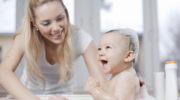Breastfeeding is an absolutely natural biological process and absolutely no one is surprised about it. But sometimes, due to various circumstances, life develops in such a way that a mother cannot feed her baby on her own.
In most cases, the mother simply feeds the baby some infant formula. However, more and more often there is such a phenomenon as a woman breastfeeding someone else’s child.
Even at the beginning of the century, wet nurses were very popular. All ladies from noble families bandaged their breasts immediately after giving birth and entrusted feeding to these women.
In our time, a heated debate is being conducted around this issue. Breastfeeding advocates unanimously argue that donor milk feeding is beneficial and does not pose any risk to the health of the baby.
Pediatricians, on the other hand, warn parents against such decisions, citing the fact that donated breast milk can cause a serious illness of the baby. Together with breast milk, diseases such as:
- AIDS (acquired immunodeficiency syndrome). Although the supporters of donor milk feeding invoke as a counterargument the fact that the AIDS virus in human milk is in minimal quantities and the chances of infecting the child are negligible.
- Viral hepatitis. The risk of transmitting diseases to your baby is very, very high.
- Cytomegalovirus is also very often transmitted through breast milk.
Do not forget about such a seemingly insignificant thing as the microflora in the baby’s mouth, which is as individual as fingerprints. It is likely that, after feeding someone else’s baby, a woman after a while finds unpleasant signs of stomatitis in the oral cavity of her own child.
In addition, doctors – immunologists also speak out sharply against the child being fed with donor milk. They explain their function by the facts of scientific research.
As you know, in the first few days after childbirth, colostrum is produced in a woman’s breast. Previously, doctors underestimated the value of colostrum, but researchers have proven that it is the most valuable. Colostrum contains a huge amount of immunoglobulins and antibodies vital for the baby, which have a powerful protective effect on the body of a newborn who has not yet adapted to the new environment around him. Moreover, in the milk of each particular woman there are exactly those antibodies which her baby needs. A woman who is breastfeeding someone else’s child exposes the baby’s still immature immune system to a completely unnecessary stress. As a result, the effect is exactly the opposite of the desired one.
Almost the same applies to the baby’s gastrointestinal tract. As you know, the nutritional value and composition of human milk changes daily, as the consumer changes. And the milk that will be useful for a one-year-old baby can harm a newborn baby.
Disposable Nursing Pads for Breastfeeding, 200 Count
Usually, supporters of feeding with donor milk, in response to this fact, cite the example of those mothers who feed their children with the so-called “tandem”, that is, both an older child and a newborn baby. At first glance, this objection seems absolutely logical: the health of such children does not suffer from breastfeeding. But it is necessary to take into account one interesting feature of the female body, in particular, the lactation process. With a new pregnancy, the process of natural extinction of lactation occurs. Very often this process happens very quickly. But, nevertheless, the woman’s body reorganizes the needs of the newborn baby. The only difference from the usual lactation process is only that more milk is produced, since the not one, but two babies feed on mother’s milk.
If there is the case that for some reason you cannot feed your baby for a while, instead of giving the baby someone else’s milk, prepare your own milk in advance by freezing it in the refrigerator. During times when feeding is not possible, constantly express milk from your breast. This will help you keep lactating until a better time.

Even if lactation has practically stopped, but the desire to breastfeed remains, it is quite possible to restore it, it is not as difficult as it seems. Moreover, if a woman wants to breastfeed her adopted child, even in this case (taking into account the fact that the woman did not give birth), it is quite possible to start the lactation process. For the sake of fairness, it should be said that breastfeeding an adopted child is perhaps the only justified case of using donor milk.










